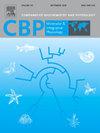Cold temperature delays ovarian development of largemouth bass by inhibiting sex hormone release, angiogenesis, apoptosis and autophagy during out-of-season reproduction
IF 2.2
3区 生物学
Q4 BIOCHEMISTRY & MOLECULAR BIOLOGY
Comparative Biochemistry and Physiology A-Molecular & Integrative Physiology
Pub Date : 2024-12-19
DOI:10.1016/j.cbpa.2024.111795
引用次数: 0
Abstract
Cold temperature is an effective method of achieving out-of-season reproduction and obtaining fry in the autumn. This study investigated the effects of low-temperature (12–16 °C) environment on the out-of-season reproduction of largemouth bass, particularly the delayed effects on ovarian development. During the period of delayed out-of-season reproduction, there was a significant reduction in the levels of serum sex hormones (FSH and LH) and their respective receptors (FSHR and LHCGR). Exposure to cold temperature significantly reduced the expression of gonadal development genes (IGF-1, GDF9, and CDC2) (P<0.05) and diminished the vascular network on the ovarian membrane, as confirmed by angiogenesis-related analyses. In lipid metabolism, AMH mRNA levels decreased overall, while HSD3B, FABP1, APOA1, and APOC2 initially increased before declining. Serum VTG levels decreased gradually with a slight increase post-spawning. These findings suggested that cold temperature delay ovarian development in largemouth bass by impacting sex hormone synthesis, angiogenesis, and lipid deposition. This insight enhances our understanding of out-of-season reproduction and guides the development of more effective reproductive techniques.

低温通过抑制大口黑鲈越季繁殖过程中性激素的释放、血管生成、细胞凋亡和自噬来延缓卵巢发育。
低温是实现越季繁殖和在秋季获得鱼苗的有效方法。本研究探讨低温(12-16 °C)环境对大口黑鲈越季繁殖的影响,特别是对卵巢发育的延迟影响。在延迟越季繁殖期间,血清性激素(FSH和LH)及其受体(FSHR和LHCGR)水平显著降低。暴露于低温显著降低了性腺发育基因(IGF-1、GDF9和CDC2)的表达(P
本文章由计算机程序翻译,如有差异,请以英文原文为准。
求助全文
约1分钟内获得全文
求助全文
来源期刊
CiteScore
5.00
自引率
4.30%
发文量
155
审稿时长
3 months
期刊介绍:
Part A: Molecular & Integrative Physiology of Comparative Biochemistry and Physiology. This journal covers molecular, cellular, integrative, and ecological physiology. Topics include bioenergetics, circulation, development, excretion, ion regulation, endocrinology, neurobiology, nutrition, respiration, and thermal biology. Study on regulatory mechanisms at any level of organization such as signal transduction and cellular interaction and control of behavior are also published.

 求助内容:
求助内容: 应助结果提醒方式:
应助结果提醒方式:


